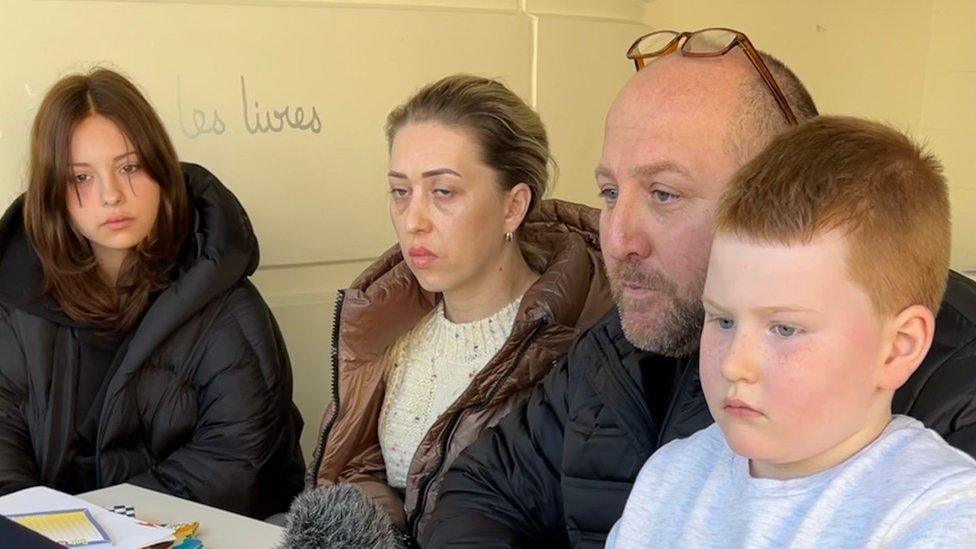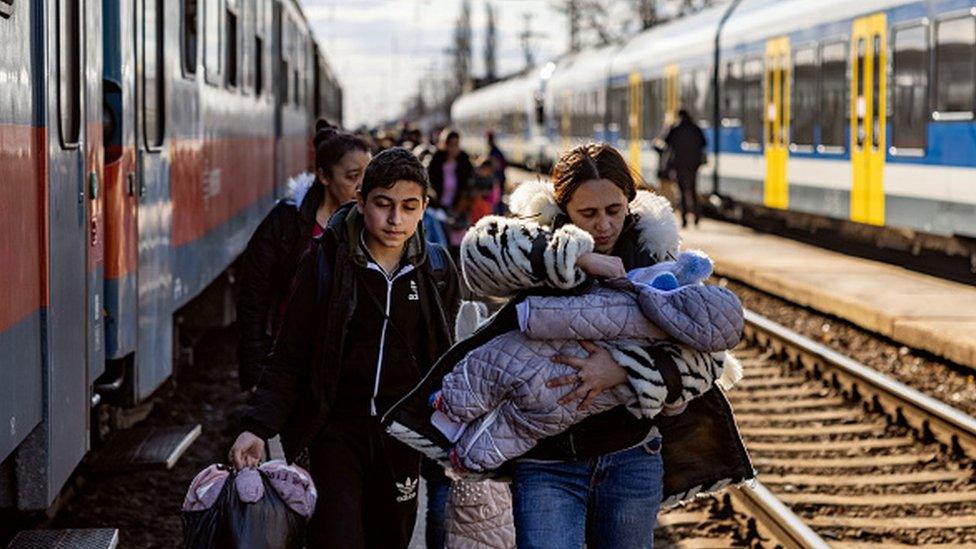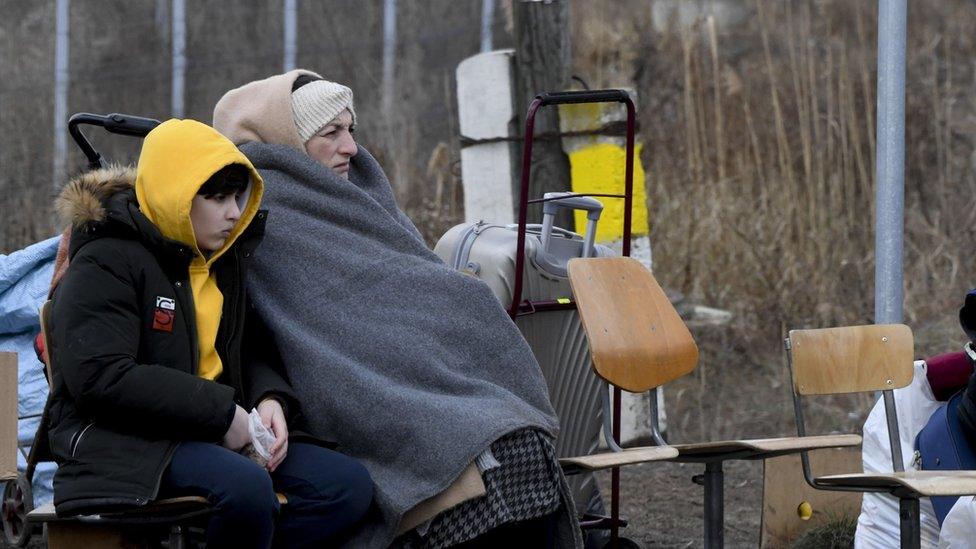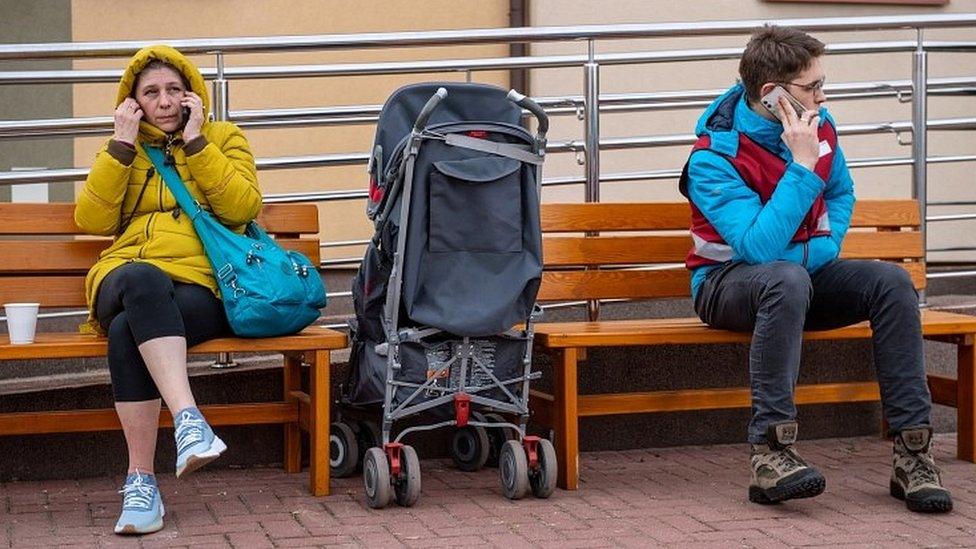Ukraine war: UK can and will do more for refugees - minister
- Published
Watch: Ben Wallace says visa process for refugees coming from Ukraine could be quicker
The UK needs to speed up the processing of visas for refugees fleeing the war in Ukraine, the defence secretary has said.
Ben Wallace told the BBC the government could and would do more to support refugees, and his department would help the Home Office accelerate the system.
The UK has granted visas to 300 Ukrainian refugees under its new scheme so far, the Home Office said.
It added that 17,700 applications to re-join relatives had been started.
But about 600 refugees are stuck in Calais, with many saying they were turned away for lack of paperwork.
Almost 300 people have been turned away while trying to cross to the UK, French officials told the BBC.
Downing Street said a new visa processing site would be established in the northern French city of Lille "in the coming days".
When asked why it was not being set up in Calais, where Ukrainian refugees are stuck, a No 10 spokesman said the government wanted to ensure it can give the "appropriate level of support" refugees require.
Up until now people in Calais have been told to go to Paris to apply for their visa, with some Ukrainians telling the BBC they faced a wait of more than a week just for an appointment in the French capital.
Diane Abbott says a lack of help in Calais for Ukrainian refugees brings the UK into disrepute
The UN says that more than two million people have now fled the war in Ukraine, external - most of them to Poland.
Unlike the European Union - which is allowing Ukrainians three-year residency without a visa - the UK has retained controls on entry, with Prime Minister Boris Johnson saying it was "sensible" to "have some basic ability to check who is coming in and who isn't".
There are two main routes to a visa for refugees from the war, requiring them either to have family in the UK, or a British sponsor for their application.
After criticism from France that the UK's approach showed a "lack of humanity", Ms Patel said she had "surged a Home Office team" to help at Calais - and denied anyone had been turned back at the border.
But the BBC found a Home Office presence at a local administrative building disappeared on Monday morning, while a sign at the hostel where many refugees were staying directed them to Brussels or Paris for visa applications.
Calais' sub-prefect Véronique Deprez-Boudier said that 286 Ukrainian refugees have been turned away by UK authorities so far.
She told the BBC it is "important to build a more organised team" in Calais to assist them to get visas, rather than make them travel elsewhere to secure one.
The Home Office said staff have been "surged" at appointment centres across Europe - including in Poland, Romania, Hungary, Moldova and the Czech Republic - as well as in the UK in order to process applications as quickly as possible, while maintaining "essential security checks".
A spokesperson said the UK stands "shoulder-to-shoulder" with the Ukrainian people and it was "working at pace to process applications as quickly as possible".
Ukraine has begun evacuating civilians from the town of Irpin, near the capital Kyiv, and the northern city of Sumy after Russian and Ukrainian officials agreed to set up humanitarian corridors.
But on Tuesday, Ukrainian officials said Russian forces were shelling an evacuation route out of the besieged southern city of Mariupol.
Ukrainian cities have continued to suffer heavy bombardment from Russian forces, causing several civilian evacuation plans to collapse.

War in Ukraine: More coverage

Speaking to BBC Breakfast, the defence secretary said the UK's visa scheme for Ukrainian refugees was "generous" but conceded "we can... and will do more".
Insisting the "vast" scheme would allow hundreds of thousands of Ukrainians to enter the UK, he said: "It's not the case that we are only allowing 300 people in... the system has not been quick enough, which is what we're going to address."
Challenged on the 600 Ukrainians stuck in Calais and whether visas should be processed there, Mr Wallace insisted he was "not the home secretary" and the detail on how to process the visas was a matter for Ms Patel's department.
He said she was "determined" to speed up the process and - revealing his department has offered to help - added: "we'll all lean in to help the Home Office deliver that".
Mr Wallace also said the UK will increase its "lethal and non-lethal aid" to Ukraine and he will set out further details in a statement MPs on Wednesday.
Meanwhile, Justice Secretary Dominic Raab will travel to the Hague to help an international effort to gather evidence on Russian war crimes in Ukraine, the foreign secretary told MPs on Tuesday.

'No-one can help us here'
By Mark Easton, BBC home editor in Calais

The Raminishvili family are stuck in Calais
Misha Raminishvili was close to despair, his daughter in tears, as the news came through.
"No visa for at least another week," he said, simply. "No-one can help us in Calais."
I met Misha, with his Ukrainian wife Maria and two children, at a hostel in the French port which is accommodating 137 Ukrainian refugees.
Misha has a house in Hornchurch, east London, but lives between there and Kyiv.
He and his son, Misha Jr, have UK passports. But his wife Maria, and daughter Gabrielle, do not - and therefore need visas to enter the UK, which require biometric checks.
Misha has been stuck in Calais for five days, unable to get his family across the Channel, in what would be the last leg of a journey that began on 24 February.

The Home Office repeated its claim that it was the first visa scheme to launch since the Russian invasion of Ukraine.
Since the Ukraine Family Scheme launched on 4 March, 8,900 applications have been submitted, while 4,300 applicants have made appointments to submit their biometric details.
Of these, 640 applications have been confirmed, the Home Office said, and 300 visas have been issued so far.
Refugee and migrant rights director Steve Valdez-Symonds said the Home Office was "once again too slow and too bureaucratic in response to a refugee crisis that almost everyone saw coming".
Labour leader Sir Keir Starmer said the government should be offering a "simple route to sanctuary" for people in danger, and said the Home Office is "in a complete mess".


Have you been affected by the issues raised in this story? You can get in touch by emailing: haveyoursay@bbc.co.uk, external.
Please include a contact number if you are willing to speak to a BBC journalist. You can also get in touch in the following ways:
WhatsApp: +44 7756 165803, external
Tweet: @BBC_HaveYourSay, external
Or fill out the form below
Please read our terms & conditions and privacy policy
If you are reading this page and can't see the form you will need to visit the mobile version of the BBC website to submit your question or comment or you can email us at HaveYourSay@bbc.co.uk, external. Please include your name, age and location with any submission.

BIG BUSINESSES AND CLIMATE CHANGE: Deborah Meaden talks to some of the world's biggest business about the biggest problem facing the planet
JUST STAND UP: Can we burn more calories and lower blood sugar levels without even doing any exercise?

- Published4 July 2022

- Published7 March 2022

- Published4 March 2022
